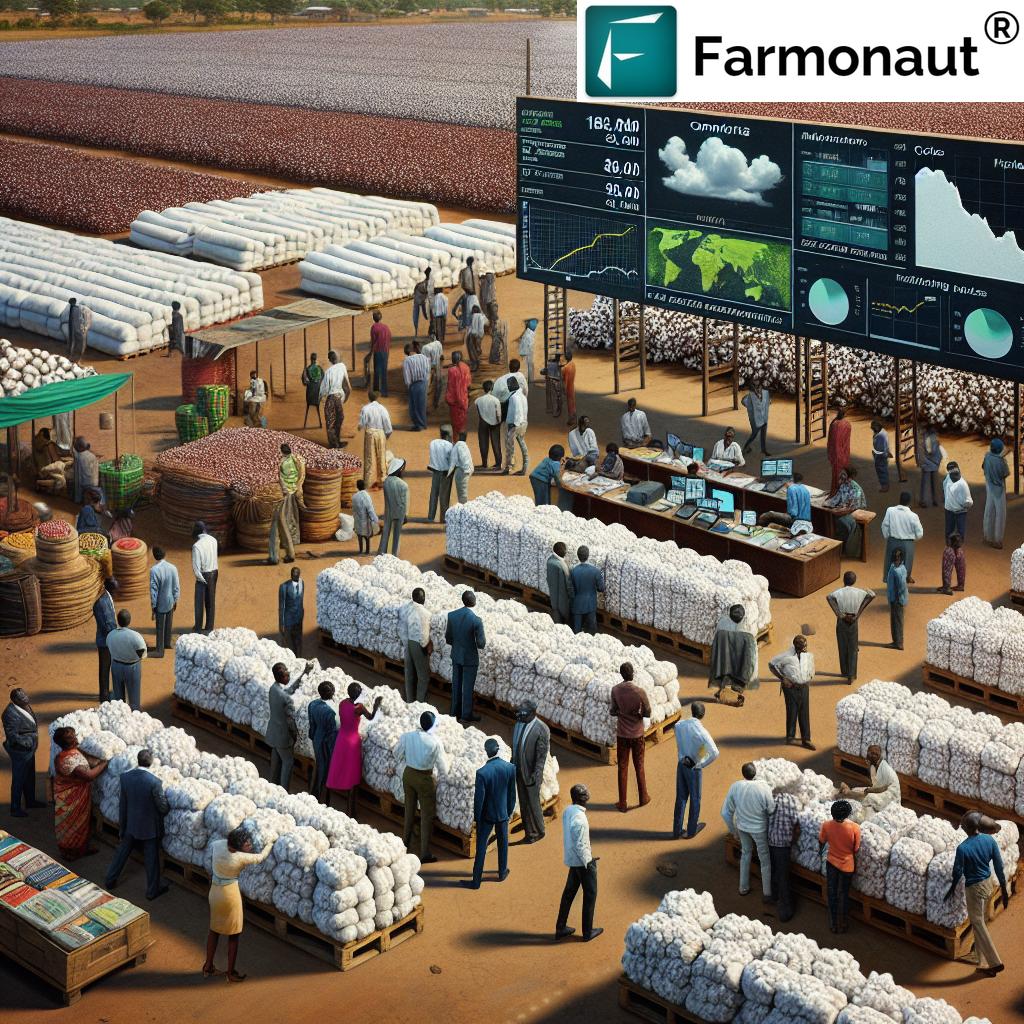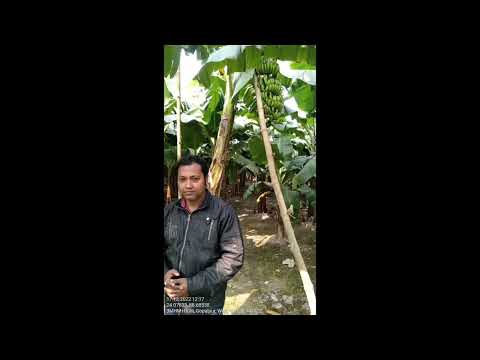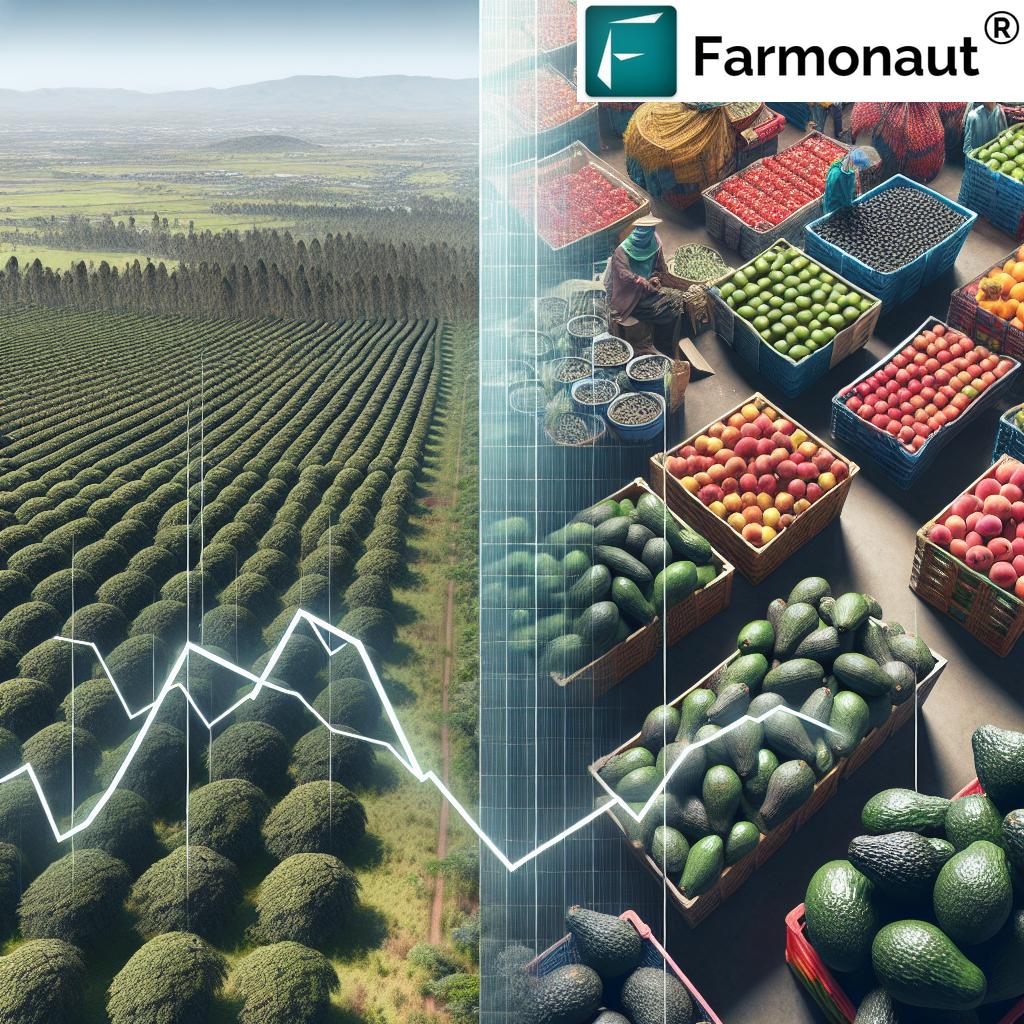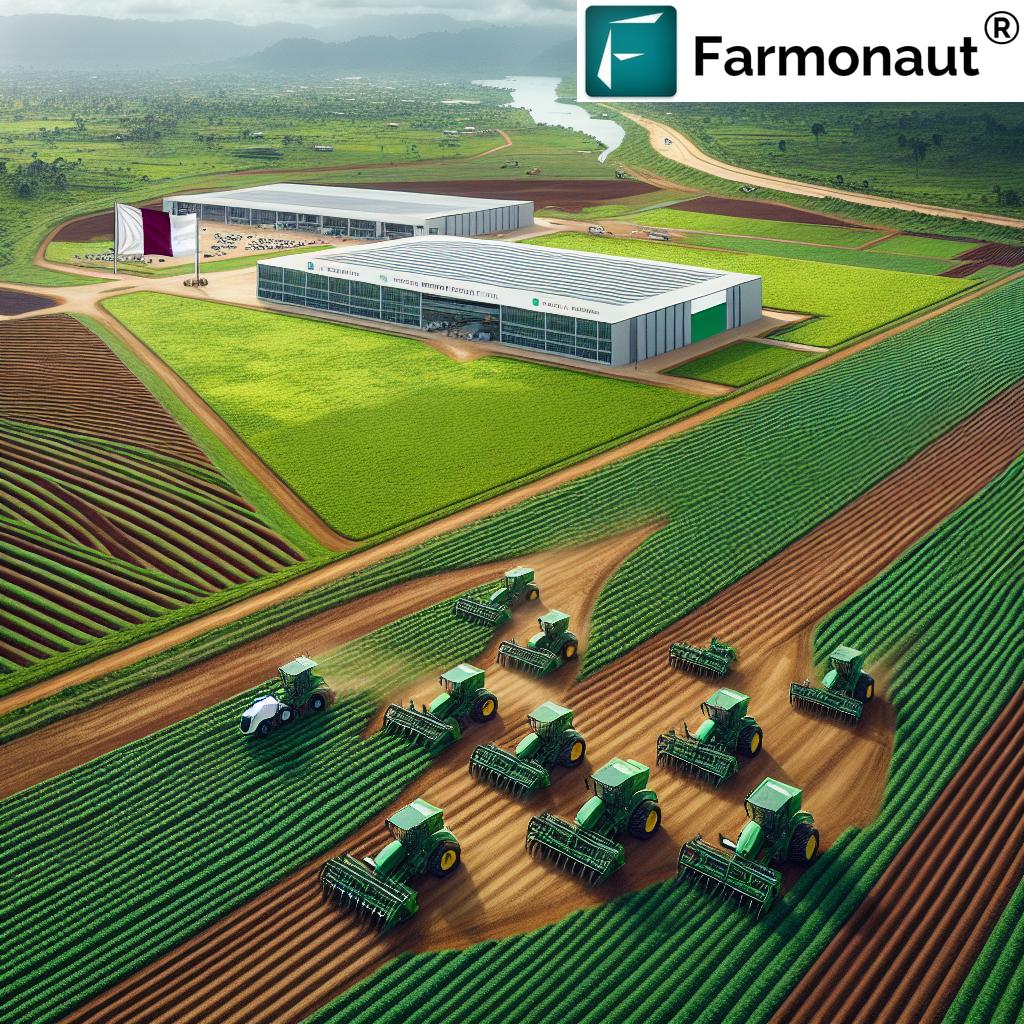Revolutionizing Zimbabwe’s Cotton Industry: Farmonaut’s Agritech Solutions for Quality Seed Production and Rural Development
“Zimbabwe’s cotton industry contributes significantly to export earnings, with over 300,000 smallholder farmers involved in production.”
Welcome to our comprehensive exploration of Zimbabwe’s thriving cotton industry and the transformative role of agritech solutions in enhancing seed cotton quality standards and agricultural marketing services. As we delve into this vital sector, we’ll uncover how innovative approaches are reshaping the landscape for smallholder farmers, boosting rural development, and positioning Zimbabwe as a key player in the global agricultural marketplace.
The Importance of Cotton in Zimbabwe’s Economy
Cotton has long been a cornerstone of Zimbabwe’s agricultural sector, playing a crucial role in the nation’s economy and rural livelihoods. As we examine the industry’s impact, it’s essential to understand its significance in terms of export earnings and employment generation.
- Economic Contribution: Cotton is a major contributor to Zimbabwe’s GDP and foreign exchange earnings.
- Rural Employment: The industry supports hundreds of thousands of smallholder farmers and their families.
- Value Chain: From farming to ginning and textile production, cotton creates a robust value chain within the country.
To better illustrate the industry’s current state, let’s take a look at this comprehensive overview:
| Aspect | Data |
|---|---|
| Production Metrics | Estimated annual cotton production: 100,000 tons |
| Economic Impact | Contribution to GDP: 3.5% |
| Rural Development | Number of smallholder farmers involved: 300,000+ |
| Quality Standards | Grading system categories: A, B, C, D |
| Sustainable Practices | Adoption rate of sustainable farming methods: 35% |
| Export Data | Major export destinations: China, South Africa, EU |
| Agritech Integration | Percentage of farmers using Farmonaut’s solutions: 15% |
| Challenges | Climate volatility, market price fluctuations, pest management |
| Market Trends | Price fluctuations: +/- 20% over the past 5 years |
As we can see, the cotton industry in Zimbabwe is a complex and vital component of the nation’s agricultural landscape. With the integration of agritech solutions like those offered by Farmonaut, we’re witnessing a new era of precision farming and sustainable practices.
Challenges Faced by Smallholder Cotton Farmers
Despite the industry’s importance, smallholder farmers in Zimbabwe face numerous challenges in cotton production. Understanding these obstacles is crucial for developing effective solutions and improving overall productivity.
- Climate Variability: Unpredictable weather patterns and increasing frequency of droughts pose significant risks to crop yields.
- Limited Access to Technology: Many farmers lack access to modern farming techniques and precision agriculture tools.
- Market Volatility: Fluctuating global cotton prices can severely impact farmers’ incomes.
- Pest and Disease Management: Cotton is susceptible to various pests and diseases, requiring constant vigilance and management.
- Resource Constraints: Limited access to quality inputs, such as seeds and fertilizers, can hinder productivity.
To address these challenges, innovative approaches and technologies are being introduced to the Zimbabwean cotton sector. This is where Farmonaut’s agritech solutions come into play, offering farmers tools to optimize their production and improve their livelihoods.

The Push for Sustainable Cotton Production Practices
Sustainability has become a key focus in Zimbabwe’s cotton industry, with efforts to balance economic growth with environmental stewardship. Sustainable practices not only benefit the environment but also contribute to long-term profitability for farmers.
- Water Conservation: Implementing efficient irrigation systems and water management techniques.
- Soil Health: Promoting crop rotation and organic farming methods to maintain soil fertility.
- Integrated Pest Management: Reducing reliance on chemical pesticides through biological control methods.
- Conservation Agriculture: Encouraging minimal tillage and cover cropping to prevent soil erosion.
- Precision Farming: Utilizing technology to optimize resource use and reduce waste.
Farmonaut’s satellite-based crop health monitoring system plays a crucial role in promoting these sustainable practices. By providing real-time data on crop health, soil moisture levels, and other critical metrics, farmers can make informed decisions about resource allocation and management.
Explore Farmonaut’s innovative solutions:
The Importance of Seed Cotton Quality Standards
“The implementation of a standardized cotton grading system has improved quality control, resulting in a 25% increase in premium-grade cotton exports.”
Quality standards play a pivotal role in determining the value and marketability of Zimbabwe’s cotton. The implementation of stringent seed cotton quality standards has significantly improved the country’s standing in the global market.
- Grading System: Zimbabwe employs a comprehensive grading system (A, B, C, D) based on fiber quality, cleanliness, and other factors.
- Premium Pricing: Higher grades fetch better prices, incentivizing farmers to focus on quality production.
- Export Competitiveness: Improved quality standards have enhanced Zimbabwe’s reputation as a reliable cotton exporter.
- Traceability: Quality standards are linked to traceability systems, ensuring transparency throughout the supply chain.
Farmonaut’s blockchain-based traceability solution complements these quality standards by providing a secure and transparent way to track cotton from farm to market. This technology not only ensures authenticity but also builds trust among buyers and consumers.
Agricultural Marketing Services and Their Impact
Effective agricultural marketing services are essential for connecting farmers with markets and ensuring fair prices for their produce. In Zimbabwe’s cotton industry, these services play a crucial role in bridging the gap between producers and buyers.
- Market Information: Providing farmers with up-to-date information on cotton prices and demand.
- Collective Marketing: Organizing farmers into groups to increase bargaining power and access to markets.
- Value Addition: Promoting processing and value addition activities to increase farmers’ income.
- Contract Farming: Facilitating agreements between farmers and buyers to ensure stable prices and market access.
- Digital Platforms: Utilizing online marketplaces and mobile apps to connect farmers directly with buyers.
Farmonaut’s platform contributes to these marketing services by providing valuable data on crop yields and quality, which can be used to negotiate better prices and contracts for farmers. The company’s AI-driven advisory system, Jeevn AI, also helps farmers make informed decisions about when and where to sell their cotton for maximum profit.
Best Practices for Producing High-Quality Seed Cotton
To meet the demanding quality standards of the global market, Zimbabwean cotton farmers are adopting a range of best practices. These methods not only improve the quality of the cotton but also contribute to increased yields and sustainability.
- Proper Seed Selection: Choosing high-quality, certified seeds suitable for local conditions.
- Timely Planting: Adhering to recommended planting dates to optimize growing conditions.
- Soil Management: Regular soil testing and appropriate fertilization to ensure optimal nutrient levels.
- Pest and Disease Control: Implementing integrated pest management strategies to minimize crop damage.
- Harvest Timing: Picking cotton at the right maturity stage to ensure optimal fiber quality.
- Post-Harvest Handling: Proper storage and transportation to maintain cotton quality until processing.
Farmonaut’s satellite-based crop monitoring system aids farmers in implementing these best practices by providing real-time data on crop health and growth stages. This information allows for timely interventions and optimal resource allocation throughout the growing season.
Learn more about Farmonaut’s API solutions:
Farmonaut API
API Developer Docs
The Role of Agritech in Transforming Cotton Farming
Agritech solutions are playing an increasingly important role in revolutionizing cotton farming in Zimbabwe. These innovative technologies are helping farmers overcome traditional challenges and optimize their operations.
- Precision Agriculture: Using GPS and satellite imagery for accurate field mapping and crop monitoring.
- IoT Sensors: Deploying sensors to collect real-time data on soil moisture, temperature, and other critical factors.
- Data Analytics: Utilizing big data and AI to provide actionable insights for farm management.
- Drone Technology: Employing drones for crop spraying, monitoring, and yield estimation.
- Mobile Apps: Providing farmers with easy access to market information, weather forecasts, and expert advice.
Farmonaut’s comprehensive suite of agritech solutions addresses many of these areas, offering Zimbabwean cotton farmers access to cutting-edge technologies that were previously out of reach. By democratizing access to precision agriculture tools, Farmonaut is helping to level the playing field for smallholder farmers.

The Impact on Rural Economic Development
The advancements in Zimbabwe’s cotton industry, particularly through the adoption of agritech solutions, are having a significant impact on rural economic development. This transformation is creating new opportunities and improving livelihoods in cotton-growing regions.
- Income Generation: Improved yields and quality are leading to higher incomes for smallholder farmers.
- Job Creation: The expansion of the cotton value chain is creating new employment opportunities in rural areas.
- Skills Development: Farmers are acquiring new skills in technology and sustainable farming practices.
- Infrastructure Development: Increased economic activity is driving investments in rural infrastructure.
- Financial Inclusion: Access to digital platforms is improving financial services for rural communities.
Farmonaut’s contributions to this rural development are multifaceted. By providing affordable access to advanced farming technologies, the company is empowering smallholder farmers to increase their productivity and profitability. Additionally, Farmonaut’s partnerships with financial institutions are improving farmers’ access to credit and insurance, further supporting rural economic growth.
Zimbabwe’s Position in the Global Agricultural Marketplace
As we’ve explored the various aspects of Zimbabwe’s cotton industry and the transformative role of agritech solutions, it’s clear that the country is strengthening its position in the global agricultural marketplace. Let’s summarize the key factors contributing to this positive trend:
- Quality Improvement: Stringent quality standards and grading systems have enhanced the reputation of Zimbabwean cotton.
- Sustainable Practices: The adoption of sustainable farming methods is aligning with global demand for responsibly produced cotton.
- Technological Integration: The use of agritech solutions is improving efficiency and competitiveness.
- Market Access: Improved agricultural marketing services are opening up new opportunities for farmers.
- Rural Development: The growth of the cotton industry is contributing to overall rural economic development.
Farmonaut’s role in this transformation cannot be overstated. By providing affordable and accessible precision agriculture solutions, the company is helping Zimbabwe’s cotton industry to compete on a global scale. The integration of satellite technology, AI-driven insights, and blockchain-based traceability is positioning Zimbabwean cotton as a high-quality, sustainable product in the international market.
Future Outlook and Opportunities
Looking ahead, the future of Zimbabwe’s cotton industry appears bright, with numerous opportunities for growth and innovation:
- Expansion of Organic Cotton: Increasing demand for organic products presents an opportunity for diversification.
- Value-Added Products: Developing a stronger domestic textile industry to capture more value from cotton production.
- Climate-Resilient Varieties: Investing in research to develop cotton varieties better suited to changing climate conditions.
- Digital Integration: Further adoption of digital technologies across the entire cotton value chain.
- International Partnerships: Collaborating with global brands and retailers to secure long-term markets for Zimbabwean cotton.
As these opportunities unfold, Farmonaut remains committed to supporting the growth and sustainability of Zimbabwe’s cotton industry. By continuously innovating and adapting its technologies to meet the evolving needs of farmers and the broader agricultural sector, Farmonaut is playing a crucial role in shaping the future of cotton farming in Zimbabwe.
Conclusion
As we’ve explored throughout this blog post, Zimbabwe’s cotton industry is undergoing a remarkable transformation, driven by the implementation of quality standards, the adoption of sustainable practices, and the integration of innovative agritech solutions. The combined efforts of farmers, policymakers, and technology providers like Farmonaut are positioning Zimbabwe as a key player in the global cotton market.
The journey towards a more productive, sustainable, and competitive cotton sector is ongoing, but the progress made thus far is undeniable. By embracing precision agriculture, leveraging data-driven insights, and focusing on quality and sustainability, Zimbabwe’s cotton industry is not only improving the livelihoods of hundreds of thousands of smallholder farmers but also contributing significantly to the nation’s economic growth and rural development.
As we look to the future, the continued collaboration between traditional farming wisdom and cutting-edge technology will be crucial in addressing challenges and seizing new opportunities. With companies like Farmonaut leading the way in providing accessible and affordable agritech solutions, the future of Zimbabwe’s cotton industry looks brighter than ever.
Frequently Asked Questions (FAQ)
- What is the significance of cotton in Zimbabwe’s economy?
Cotton is a major contributor to Zimbabwe’s GDP and foreign exchange earnings, supporting hundreds of thousands of smallholder farmers and their families. - How are agritech solutions transforming cotton farming in Zimbabwe?
Agritech solutions like Farmonaut’s satellite-based crop monitoring and AI-driven advisory systems are helping farmers optimize resource use, improve yields, and make data-driven decisions. - What are the main challenges faced by smallholder cotton farmers in Zimbabwe?
Key challenges include climate variability, limited access to technology, market volatility, pest and disease management, and resource constraints. - How does the cotton grading system work in Zimbabwe?
Zimbabwe employs a comprehensive grading system (A, B, C, D) based on fiber quality, cleanliness, and other factors, which helps determine pricing and market access. - What sustainable practices are being adopted in Zimbabwe’s cotton industry?
Sustainable practices include water conservation, soil health management, integrated pest management, conservation agriculture, and precision farming techniques. - How is Farmonaut contributing to the development of Zimbabwe’s cotton industry?
Farmonaut provides affordable access to precision agriculture tools, real-time crop monitoring, AI-driven insights, and blockchain-based traceability solutions, helping farmers improve productivity and compete globally. - What opportunities exist for the future of Zimbabwe’s cotton industry?
Future opportunities include expanding organic cotton production, developing value-added products, investing in climate-resilient varieties, further digital integration, and forming international partnerships.




















